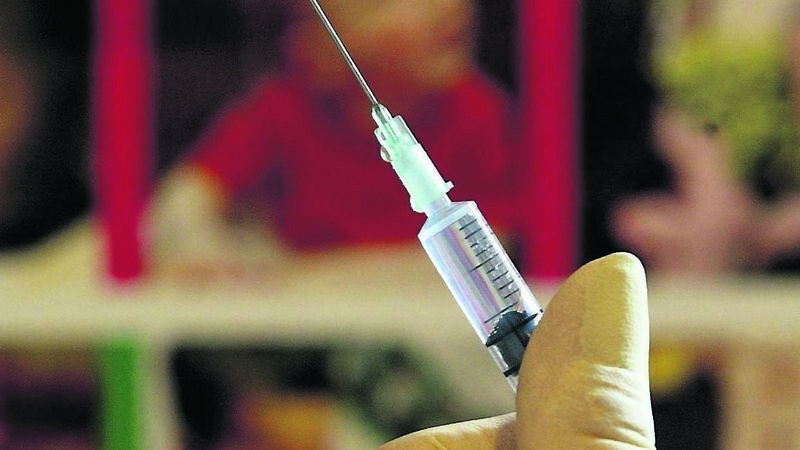Whooping cough is the next big disease threat to babies

His outspoken advocacy for vaccination necessitates that he travels with six security personnel, as he warns about the “normalisation of untruth”, including by anti-vaxxers online, as people are being discouraged from vaccinating their children.
The esteemed public health and infectious disease expert said that anti-vaccination campaigners “gained a lot of strength during the Covid-19 pandemic”, and that a tremendous energy is being put into spewing ‘anti-science’ narratives online.
This reality is playing out across Europe and the UK, as measles cases surge.
Now, whooping cough cases are also escalating rapidly across Northern Ireland, the UK and Europe, with the latest figures from the Health Protection Surveillance Centre (HPSC) showing whooping cough is on the rise in Ireland as well.
The most recent figures from HPSC National Notifiable Disease hub show there have been 70 cases in Ireland over the last 12 weeks, with more than half of those occurring in just the last four weeks (36). This compares to just 94 cases in the last 52 weeks and these are only the ones we know about, which is possibly the tip of a very large iceberg.
The trajectory is upwards.
This increase in cases is a concern amid evidence of falling uptake of the pertussis-containing 6 in 1 vaccine for children under the age of 12 months.
Figures from the HPSC show 6 in 1 vaccination rates at 12 months from the second quarter of 2023 were 84.6%, a fall of over 4 percentage points on 6 in 1 vaccination rates in the same cohort before the Covid- 19 pandemic in the first quarter of 2018.
The PHA report 838 clinically suspected cases in NI this year with 670 (80%) of those laboratory confirmed up until April 28. While numbers in January were reported as between one and 12 cases per week, numbers in February climbed to 30 cases per week, with a surge of 163 cases per week in the last week in April.
With these kind of figures being described on the island of Ireland, it is only a question of time before similar figures for whooping cough are reported here.
A resurgence of whooping cough (pertussis) in England was reported in an editorial in the British Medical Journal this month, with similar patterns emerging in many countries across Europe.
This is thought to be the result of the natural cyclical pattern of pertussis, where cases rise every few years, in combination with a steady reduction in pertussis vaccine uptake among pregnant women and children.
Last September, Denmark declared a pertussis epidemic after the incidence rose throughout the summer. Similarly, the Czech Republic is experiencing its worst pertussis outbreak in a decade. Other affected countries include Belgium, Norway, Spain and the Netherlands.
Helen Bedford, Professor of Children’s Health at University College London, said this month that one reason for falling vaccination rates could be due to concern about the effect of the Covid vaccine on pregnant women.
“My own assessment is that a lot of questions that were raised about the Covid vaccine have been transferred to other vaccines,” she said.
“There was so much discussion during the pandemic and some of that has made people more questioning.”
Whooping cough is a very contagious disease that is easily spread from person to person. It is caused by bacteria called Bordetella pertussis that live in the mouth, nose and throat, and is spread by personal contact, coughing and sneezing.
Many reported cases occur among infants, some of whom are too young to have received the three primary doses of vaccine necessary to provide protection.
Since 2013, pertussis vaccine has been recommended for pregnant women in Ireland during each pregnancy- to provide protection by maternal immunity- to infants in the first few months of life when they are too young to be vaccinated and are at their most vulnerable.
Most cases of whooping cough involve some degree of collapsed lung and/or pneumonia. Babies may stop breathing.
Pneumonia may be severe enough to lead tragically, to death. About half the deaths from whooping cough are due to pneumonia. Thankfully, those who survive usually do not experience lung damage.
There may be altered consciousness or convulsions. This is most likely due to a lack of oxygen or small amounts of bleeding in the brain.
Overall, of the people who get whooping cough:
1 in five will go to hospital (1 in 2 if less than 6 months)
1 in 20 will get pneumonia (1 in 10 if less than 6 months)
1 in 100 will have fits (1 in 70 if less than 6 months)
1 in 500 will die from pneumonia or brain damage (90% of deaths are in children less than 6 months)
1 in 1,000 will get encephalitis or inflammation of the brain (1 in 500 if less than 6 months)
Despite what anti-vaxxers tell us, this really nasty infection can be prevented by vaccination.
A booster vaccine is given at aged 4-5 that protects against Diphtheria, Pertussis, Polio and Tetanus, and another booster is given in 1st year of secondary school which also protects against Diphtheria, Pertussis and Tetanus. This is particularly important to prevent whooping cough in teenagers with waning immunity.
Pertussis vaccine in combination with Diphtheria and Tetanus (Tdap) is also recommended as completely safe for pregnant women after 16 weeks and up to 36 weeks gestation in each pregnancy, to protect themselves and their infant in the first few months of life.
Dr Fauci counsels that if vaccination rates start to drop “we’re all going to be in a lot of trouble.”.
Well, in Ireland now, falling vaccination rates are unfortunately and tragically for an increasing number of people, a stark reality.
Vaccination is the most effective tool we have to curb yet another highly contagious preventable infection from widespread transmission - risking serious illness in tiny infants that are the most vulnerable.
Dr Catherine Conlon is a public health doctor in Cork.







 App?
App?




